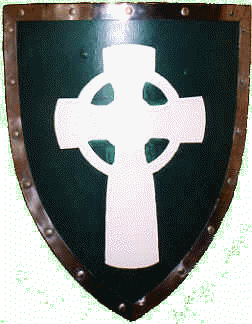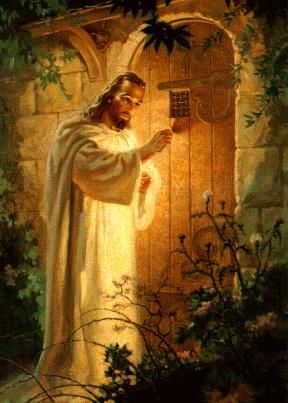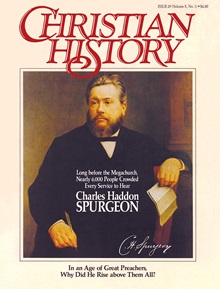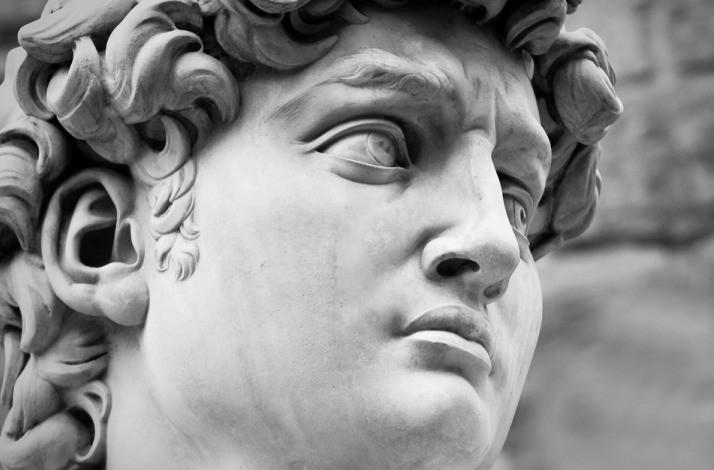Key Insights for Christian Leaders from the Prince of Preachers
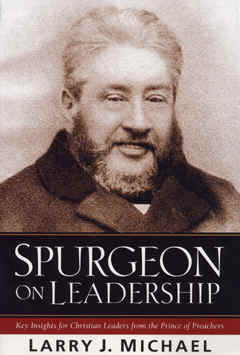
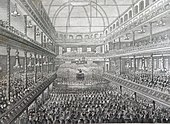
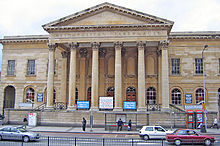
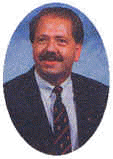
Dr. Larry J. Michael served as Senior Pastor of First Baptist Sweetwater, near Orlando, Florida; also as Adjunct Professor at Beeson Divinity School, Samford University, in Birmingham, Alabama. ______________________________

Book Review: Spurgeon on Leadership by Larry J. Michael -- From the Foreword by Lewis A. Drummond:
FROM THE BOOK’S BACK COVER:
“Few people argue against the contention that the greatest pastor-evangelist of the British scene in the dynamic nineteenth century was Charles Haddon Spurgeon.
In this new work, Spurgeon On Leadership by Dr. Larry Michael, the author has outlined and presented the basic leadership fundamentals that Spurgeon incorporated so well into his life and ministry. This book covers the gamut of the aspects of leadership.
Dr. Michael points out not merely the mechanics or psychology of what it means to be an influential leader, but also important fundamentals such as Christian commitment and moral character.
Moreover, he shows how Spurgeon demonstrated extreme courage and conviction for those principles and how, in the various controversies that surrounded his ministry, he rose to meet them with a genuine sense of Christian maturity and Biblical fidelity.
Michael also stresses important characteristics such as grasping a vision for the task and prioritizing one’s ministry in both the setting and the context of pastoral compassion and leadership.
He does not exclude the fact that leadership often entails suffering, and that was where Spurgeon truly ascended to the heights of leadership.
Dr. Michael has produced a superb work; it will unquestionably make a lasting contribution to many lives.”
“My great-grandfather came to Christ and was trained as a Pastor through the ministry of Charles Spurgeon.
He passed on to me many of Spurgeon’s insights through his books and articles, which I treasure to this day…
Spurgeon’s model of leadership has profoundly influenced my life and ministry.
I’m thrilled that Larry Michael’s wonderful and insightful new book will introduce a new generation to Spurgeon’s model of leadership.”
-Rick Warren, Pastor of Saddleback Church; Author: “The Purpose Driven Church” and “The Purpose Driven Life”

Book Review: Spurgeon on Leadership by Larry J. Michael
Article: "Spurgeon and the Power of Prayer" by Larry J. Michael
(This article is an adaptation by the author, of writings from the book: Spurgeon on Leadership, Kregel Publications. We are grateful to the author for permission to use this feature. Copyright 2003 Larry J. Michael. All Rights Reserved. Used by permission.)
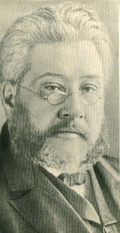
Personal Prayer With God
Everyone believes in prayer. Or so, that’s what we are told. The practice of prayer is advocated by people of faith everywhere. There are courses on prayer, conferences on prayer, concerts of prayer, even colloquiums on prayer. Christian leaders regularly pontificate about its necessity from the pulpit and classroom.
But, if the reports are correct, there are not nearly as many practitioners as there are proponents of this great source of spiritual power. And leaders, if not careful, can be the worse culprits in not practicing what they preach, when it comes to prayer. The tyranny of other urgent demands upon their time can rob leaders of the infinitely valuable time they spend in personal prayer with God.
A leader must be prayer empowered to be effective. The Bible tells us to pray without ceasing. C. H. Spurgeon believed greatly in the need for prayer: He urged pastors to:
“Make the most of prayer. . . . Prayer is the master–weapon. We should be wise if we used it more, and did so with a more specific purpose.”
Spurgeon, An All-Round Ministry
Spurgeon was said never to have prayed more than five minutes at a time, but he never went more than five minutes without praying. He often mentioned that the secret of his success was prayer, and he cited the many church members who prayed regularly in the basement during the services and on other significant occasions. Well-known church growth author/leader Peter Wagner writes,
“The more deeply I dig beneath the surface of church growth principles, the more thoroughly convinced I become that the real battle is a spiritual battle and that our principle weapon is prayer.”
An effective leader must have a deep prayer life. Spurgeon wrote of the power of prayer:
“All hell is vanquished when the believer bows his knee in importunate supplication. Beloved brethren, let us pray. We cannot all argue, but we can all pray; we cannot all be leaders, but we can all be pleaders; we cannot all be mighty in rhetoric, but we can all be prevalent in prayer. I would sooner see you eloquent with God than with men. Prayer links us with the Eternal, the Omnipotent, the Infinite, and hence it is our chief resort. . . Be sure that you are with God, and then you may be sure that God is with you.”
Seminary Dean Thom Rainer gives statistical evidence regarding the power of prayer:
“A study of churches that were previously plateaued or declining but now experiencing growth revealed a fascinating statistic. The report concluded that 71% of these churches reported an increased emphasis on prayer over the past several years as compared to only 40% of churches which continue on the plateau.”
(Thom Rainer, Eating the Elephant. Nashville: Broadman, 1994, P. 23).
Such prayer does not happen without the leadership of the pastor. A Christian leader must continue to grow and lead in the discipline of prayer. The Christian leader should set the example of devotion and prayer in the home. A close friend of Spurgeon commented on his prayer life,
“His public prayers were an inspiration, but his prayers with the family were to me more wonderful still. Mr. Spurgeon, when bowed before God in family prayer, appeared a grander man even than when holding thousands spellbound by his oratory.”
Mrs. Spurgeon remembered, “At the tea-table, the conversation was bright, witty, and always interesting; and after the meal was over, an adjournment was made to the study for family worship, and it was at these seasons that my beloved’s prayers were remarkable for their tender childlikeness, their spiritual pathos, and their intense devotion. He seemed to come as near to God as a little child to a loving father, and we were often moved to tears as he talked thus face to face with his Lord.”
Spurgeon told pastors how one should set the example: “He prays as a husband and as a father; he strives to make his family devotions a model for his flock.”
Many leaders today have gotten away from family devotions at home, but that quality time with family around God’s Word is essential for the one who seeks to lead his family in spiritual matters.
The Therapy of Prayer
Spurgeon was a great believer in the power of prayer, especially during the many times of illness in his life. He often praised God and thanked the people in his church for their prevailing prayers, which he believed helped ease his suffering and brought restoration to him. On one occasion, he received a letter, signed by the deacons and elders, that concluded thus:
“And now, beloved Pastor, we leave you, with many prayers, in the hands of your Father and our Father. May He have you in His safe keeping, preserve you from lowness and depression of spirits, cheer you with the light of His countenance, strengthen and sustain you by His gracious Spirit, and, in His own good time, bring you again to your beloved Tabernacle in the fullness of the blessing of the gospel of Christ. This is our fervent prayer.”
In 1871, Spurgeon had a long and painful illness that kept him
out of his pulpit for twelve Sundays. He wrote many times to the congregation at the Tabernacle, seeking their prayers:
“Dear Friends, The furnace still blows around me. Since I last preached to you, I have been brought very low. My flesh has been tortured with pain, and my spirit has been prostrate with depression. . . .
You do pray for me, I know; but I entreat you not to cease your supplications. I am as a potter’s vessel when it is utterly broken, useless, and laid aside. Nights of watching, and days of weeping have been mine, but I hope the cloud is passing. . . .
In this relative trial, a very keen one, I again ask your prayers. The Lord be with you evermore! Amen. So prays Your suffering Pastor, C.H.S.”
Exhorting the Church to Prayer
At one point in a lengthy illness, Spurgeon reproved the church for not gathering for special prayer for his recovery:
“Perhaps, if the church met for prayer, I should be speedily restored. I know thousands do pray, but should not the church do so as a church?”
The Pastor’s suggestion that the church should meet for prayer was immediately set in motion, and the result was thus chronicled in the next letter:
“My Beloved Friends, As soon as the church had resolved to meet for special prayer for me, I began rapidly to recover. . . . We may truthfully say of the Wednesday meeting for prayer, that the Lord fulfilled this Word: ‘Before they call, I will answer; and while they are yet speaking, I will hear.’ For all this great goodness, I pray you to unite with me in sincere and intense gratitude to the Lord our God.”
The occasion was one of many that the pastor blessed the Lord for the healing power of prayer. Before long, Spurgeon was back in the pulpit, and used his suffering as a means of ministering to others through his proclamation.
Spurgeon set a great example for leaders in the practice of prayer. He didn’t just talk about it – he did it!
God’s will for our lives as leaders includes the discipline of personal prayer. As we pray, so goes our leadership, and thus hinges our effectiveness in the work of God’s Kingdom. ______________________________


Book Review: Spurgeon On Leadership by Larry J. Michael
We Have More Writings by Charles Spurgeon Than by Any Other Christian in History
Charles Haddon Spurgeon was England’s best-known Preacher for most of the second half of the nineteenth century.
At the age of 20, he became Pastor of the New Park Street Church. At that time it had only 232 members.
As his fame grew among the Christian community of England, the number of people who came to listen to him speak in different venues exceeded 10,000 at times. Those in attendance sometimes included members of Parliament and the Royal Family.
Many of the great Theologians and Preachers of the last century, such as:
D.L. Moody, J. Hudson Taylor, J.C. Ryle, F.B. Meyer, the Bonar brothers, George Müller, and William Robertson Nicoll, have said that Spurgeon greatly influenced their spiritual lives. ___________________________________________________


“THE PRINCE OF PREACHERS”
Considered by his peers then and now as “The Prince of Preachers.” Charles Spurgeon built London’s Metropolitan Tabernacle into the world’s largest independent congregation during the nineteenth century. While many factors have been highlighted that help explain the effectiveness of Spurgeon’s preaching, the foremost secret that empowered Charles Spurgeon was his devotion to prayer.
When people would walk through the Metropolitan Tabernacle, Spurgeon would take them to the basement prayer room where people were always on their knees interceding for the church. Then Spurgeon would declare, “Here is the powerhouse of this church.” That statement is backed by the amazing number of sermons that Spurgeon preached on prayer. ______________________________

“We thank God for Dr. Michael, and for the very kind and encouraging words he had for our Ministry, when it was quite new, still only a few years old.
We share his love for Charles Spurgeon, and Spurgeon’s teaching.
And we greatly admire and appreciate Dr. Michael’s lifelong dedication to our Lord Jesus Christ: to Prayer, God’s Word, and Christ’s Great Commission to ‘Proclaim the Gospel to everyone throughout the world.'”
-S.G. Preston

yOuR CoMMeNtS: dr. LaRRy J. MicHAEL
8/7/2003_________________________________________________________
Your Site is very informative and quite unique.
cHARLES SpuRGEON (QuOtE):
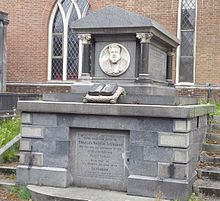


“O that Christ crucified were the universal burden of men of God.
Your guess at the number of the Beast…your conjectures concerning a personal Antichrist —
forgive me, I count them but mere bones for dogs;
while men are dying, and Hell is filling, it seems to me the veriest drivel to be muttering about an Armegeddon…
I would sooner pluck one single brand from the burning than explain all mysteries.”
-Charles Spurgeon (1834-1892) _______________________
This Website: PrayerFoundation Evangelical Lay Monks ™ Built by: S.G. Preston Ministries ™
Copyright © 1999-2024 S.G. Preston. All Rights Reserved.
Photos & Text Copyright © 1999-2024 S.G. Preston. All Rights Reserved.
